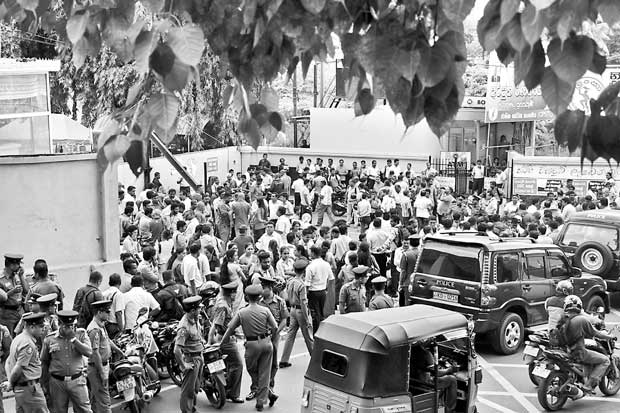Reply To:
Name - Reply Comment
Last Updated : 2024-04-18 14:58:00

A recent trade union protest by Ceylon Petroleum Corporation workers in Kolonnawa
Negotiations and allocations for the 2018 budget are underway. Prime Minister Ranil Wickremesinghe states there will be another round of liberalisation with the budget.
 Trade unions are mounting struggles against the privatisation-push and policies that favour the wealthy. And the Govt’s response is baton charges, water cannons, tear gas and even the military to run essential services.
Trade unions are mounting struggles against the privatisation-push and policies that favour the wealthy. And the Govt’s response is baton charges, water cannons, tear gas and even the military to run essential services.
Corruption continues as the dominant discourse on the economy as both the Government and the Joint Opposition accuse each other of ransacking state resources. However, successive governments are continuing with the same economic policy trajectory, and for that matter, fighting hard to take forward the very same projects such as the port city, SAITM, Uma Oya and the Hambantota port. Economic policy priorities, including the consequences of financialisation, trade liberalisation and privatisation that are largely missing in the debates in the public domain.
The current Govt accuses the Rajapaksa regime of crony capitalism and claims only its liberalisation push will ensure economic prosperity. But is capitalism ever free of cronyism? And how does liberalisation affect society?
Political economic continuities
Governments may change, but there are longer-term continuities in the workings of state and capital that are important for analysing the political economy of a country. The lopsided investment in urban and other infrastructure, the promotion of financial institutions, the marketization of essential services and the expanded import of goods including luxury items, over the course of decades transform the economy. The political memory of such developments is short, as rhetoric and personalities dominate debates on the economy.
and the expanded import of goods including luxury items, over the course of decades transform the economy. The political memory of such developments is short, as rhetoric and personalities dominate debates on the economy.
The current UNP-led govt is attempting to show the history of its liberalisation antecedent in positive light. The UNP’s landslide victory in the elections of July 1977 initiated an era of open economic reforms. A month later in August 1977, anti-Tamil riots signalled the turn towards decades of ethnic violence and state repression. Draconian measures such as the Prevention of Terrorism Act and emergency rule came along with such liberalisation. Trade unions were crushed following the July 1980 strike. Inequalities drastically widened within the population and Colombo-centred uneven development characterised the economy.
The lesson we can draw from our history, as from around the world, is that liberalisation not only leads to economic disparities but also violence and repression. If it is not repression of the working and rural classes, it is attacks on minorities. The state and its repressive apparatuses are often mobilised to unleash such violence.
Capital and State
The capitalist class in Sri Lanka was historically weak compared to Western countries. Many of the state services towards some redistribution of wealth, including free healthcare and education, were consolidated during times when a range of class interests could influence the state. This was also the case in many other post-colonial societies where the modern state did not evolve in tandem with capitalist development. Rather, the state structures in those colonised countries were a creation of colonial power.
During the last four decades, the open economy with the influence of donors and the global finance capital set the economic trajectory. During this period, the weak Sri Lankan capitalist class in tandem with powerful external actors
During the last four decades, the open economy with the influence of donors and the global finance capital set the economic trajectory. During this period, the weak Sri Lankan capitalist class in tandem with powerful external actors have largely determined state policies on the economy.
The Sri Lankan state’s relationship to capital in recent times increasingly looks like the dynamics in modern western societies. In the Communist Manifesto of 1848, Marx and Engels describe the relationship of modern western states to their capitalist class, the bourgeoisie, as follows:
“Each step in the development of the bourgeoisie was accompanied by a corresponding political advance of that class. An oppressed class under the sway of the feudal nobility… the bourgeoisie has at last, since the establishment of modern industry and of the world market, conquered for itself, in the modern representative state, exclusive political sway. The executive of the modern state is but a committee for managing the common affairs of the whole bourgeoisie.”
The times ahead are worrying with the liberalisation push. The working people should prepare for resistance in the face of further repression
Indeed, financialisation, free trade, privatisation and a singular focus on increasing profits, have become the primary role of the state as it manages the affairs of capital in Sri Lanka. These market oriented policies will definitely undermine the lives of the working people, and it may even undermine some businesses, but the state serves the overall interests of domestic businesses and global capital.
Market to the fore
In this context, liberalisation in essence involves the state surrendering more and more of its economic functions to the market. In fact, the state’s resources and repressive arms are used to promote the market. And that is what the current Govt is seeking to do. Furthermore, to differentiate itself from the Rajapaksa regime, it is labelling the latter as crony capitalist.
Now crony capitalism became a widely used term in the West during the Asian Economic Crisis of 1997, about the relationship of the political class controlling the state to businesses. The claim was that if it was only up to the market, such economic crisis would not happen, and that any recovery from such crisis should be through the market mechanism alone. Ultimately, the citizens of those Asian countries paid dearly as global capital pillaged those countries after the crisis; state debts were paid for by the people and assets were sold for a song to meet the conditions of the donor agencies.
Remarkably, the Western Economic Crisis of 2008 did not lead to the label of cronyism, not even when tremendous funds were put forward by the Western states to bail out major banks on the verge of bankruptcy due to speculation. Crony capitalism then is a derogatory term used by Western powers. It is neo-colonial term used against developing countries to further pry open their markets, as happened in South East Asia after the crisis.
The UNP government pushing forward liberalisation may want to be forewarned. That after any future crisis, caused by rising imports with increased trade and capital flight with financialisation, it too may be labelled as crony capitalist.
Liberalisation accelerated by the Govt will inevitably lead to dispossession of peoples’ livelihoods and hard won state services. As markets are promoted with state subsidies and support for business, under the guise of Public Private Partnerships, it will further increase inequalities in the country.
The Joint Opposition stands exposed by policies of the previous regime it is trying to legitimise. The formal opposition, TNA, has shamefully succumbed to white-washing state repression against strikers. All these actors, in different ways are statist in their thinking, and are only concerned about the common affairs of capital. The times ahead are worrying with the liberalisation push. The working people should prepare for resistance in the face of further repression.

Add comment
Comments will be edited (grammar, spelling and slang) and authorized at the discretion of Daily Mirror online. The website also has the right not to publish selected comments.
Reply To:
Name - Reply Comment
On March 26, a couple arriving from Thailand was arrested with 88 live animal
According to villagers from Naula-Moragolla out of 105 families 80 can afford
Is the situation in Sri Lanka so grim that locals harbour hope that they coul
A recent post on social media revealed that three purple-faced langurs near t